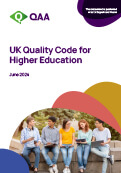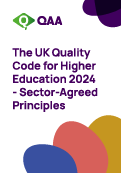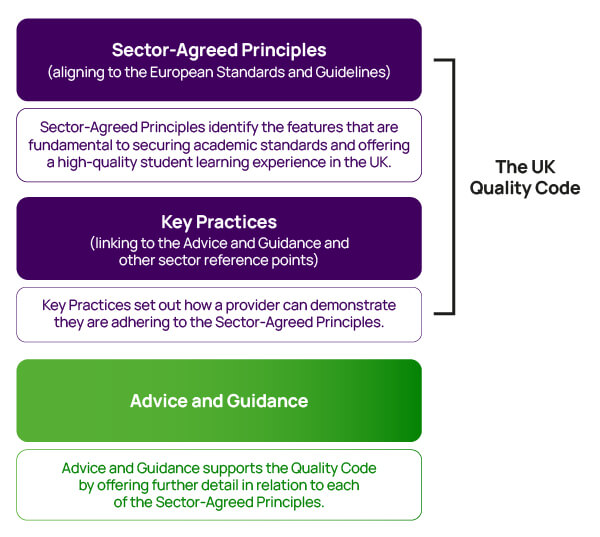Click the Principle of the Quality Code you are interested in to display its Key Practices. See the Quality Code 2024 document for full information.
 Taking a strategic approach to managing quality and standards
Taking a strategic approach to managing quality and standards
Key Practices
- Academic standards and the quality of the student learning experience are the responsibility of the provider. Degree-awarding bodies are aware that they have ultimate responsibility for the qualifications offered in their name.
- The strategic approach is employed wherever and however provision is delivered and is embedded in the culture and practices of providers.
- The strategic approach aligns with providers’ policies and practices on equity, equality, diversity and inclusion, and environmental sustainability for students and staff.
- The strategic approach to securing academic standards, quality assurance and enhancement is published, communicated clearly and accessible to staff, students and external stakeholders. It is supported by a comprehensive and transparent governance
framework.
- The strategic approach is monitored and evaluated on a regular basis.
- External expertise is a key element of the strategic approach to managing quality and standards.
See the full Quality Code for more information.
 Engaging students as partners
Engaging students as partners
Providers take deliberate steps to engage students as active partners in assuring and enhancing the quality of the student learning experience. Engagement happens individually and collectively to influence all levels of study and decision making.
Enhancements identified through student engagement activities are implemented, where appropriate, and communicated to staff and students.
Read the Advice and Guidance for Principle 2.
Key Practices
- Student engagement through partnership working is strategically led, student-centred and embedded in the culture of providers.
- Student engagement and representation activities are clearly defined, communicated, resourced and supported. Transparent arrangements are in place for the collective student voice to be heard and responded to.
- Providers demonstrate effective engagement with students, ensuring any representative groups or panels reflect the diversity of the student body. Students understand that their voice has been listened to and are aware of how their views have impacted
the assurance and enhancement of the student experience.
- Student engagement opportunities and processes are inclusive of students’ characteristics and responsive to the diversity of each provider’s student population. They involve student representative bodies, where applicable.
- Providers and student representative bodies, where such bodies are in place, recognise and celebrate the contribution of students to the enhancement of teaching and learning and the wider student experience.
- Students are enabled and encouraged to actively engage in the governance and enhancement of the wider student experience beyond the formal curriculum.
See the full Quality Code for more information.
 Resourcing delivery of a high-quality learning experience
Resourcing delivery of a high-quality learning experience
Providers plan, secure and maintain resources relating to learning, technology, facilities and staffing to enable the delivery and enhancement of an accessible, innovative and high-quality learning experience for students that aligns with the provider’s
strategy and the composition of the student body.
Key Practices
- Strategic and operational plans, along with resources, align with the student journey and are designed and implemented to support a positive student experience and enable student achievement.
- Providers ensure they have dedicated, accessible and inclusive resources to support and enhance the delivery of their programmes (and smaller units of study) along with the well-being of students and staff. These include staffing, digital and physical
resources.
- Resources are reviewed and updated in alignment with strategic developments and changes in provision, as well as staff and student recruitment. This also ensures relevance to the workplace and the wider academic discipline.
- Resources are allocated to ensure that staff receive ongoing professional development to support and enhance the delivery of a high-quality and innovative student learning and research experience.
- Processes and activities to support the management of academic standards and quality enhancement are appropriately resourced to meet strategic, operational and regulatory objectives and requirements.
- The creation, development and maintenance of accessible and inclusive learning environments (physical and virtual) offer all students the opportunity to be engaged in their learning experience and facilitate a sense of belonging. Providers ensure
they consider environmental sustainability in designing and maintaining these learning resources and facilities.
- Providers, in collaboration with staff and students, monitor and evaluate on a systematic basis the effectiveness and impact of learning environments and the resources required for the delivery and enhancement of the learning experience.
See the full Quality Code for more information.
Evaluating quality and standards
 Using data to inform and evaluate quality
Using data to inform and evaluate quality
Providers collect, analyse and utilise qualitative and quantitative data at provider, departmental, programme and module levels. These analyses inform decision-making with the aim of enhancing practices and processes relating to teaching, learning
and the wider student experience.
Key Practices
- A consistent, coherent and evidence-informed strategic approach to the collection, storage and management of data is employed across the provider. The provider makes explicit the type and level of data utilised (such as departmental, programme,
module level) and the policies and processes that underpin its use in the maintenance of academic standards and the assurance and enhancement of quality.
- Staff and students are aware of the types of data gathered and how it is stored and used in the management of quality and standards.
- When designing and operating monitoring and evaluation arrangements, staff and students adhere to ethical and data protection requirements relating to gathering and submitting data for national data sets, regulatory purposes, and internal monitoring
and evaluation.
- Staff who are required to collect, manipulate and analyse data for reporting, quality assurance and enhancement purposes receive training that enables them to undertake these activities effectively, ethically and securely. Policies cover any third-party
use of data, including applications utilising Generative Artificial Intelligence.
- Providers in partnership arrangements (including the student representative body, where applicable) ensure data sharing agreements and reporting requirements are clearly stated, understood and reviewed periodically.
- Data is collected and analysed in ways that enable providers to understand and respond to the needs of their student populations, promoting equality, diversity and inclusion, and environmental sustainability.
See the full Quality Code for more information.
 Monitoring, evaluating and enhancing provision
Monitoring, evaluating and enhancing provision
Providers regularly monitor and review their provision to secure academic standards and enhance quality. Deliberate steps are taken to engage and involve students, staff and external expertise in monitoring and evaluation activity. The outcomes and
impact of these activities are considered at provider level to drive reflection and enhancement across the provider.
Key Practices
- Providers agree strategic principles for monitoring and evaluation to ensure processes are applied systematically, operated consistently and appropriate to their operational context.
- The methods for monitoring and evaluation activity are documented to clarify their aims, objectives, intended actions and targets. They are explicit about how they will be conducted, the nature of evidence (data) to be considered and the form of reporting,
along with key indicators of success.
- Staff and students are engaged in monitoring and evaluation activities and receive appropriate training and support to undertake them.
- The actions and outcomes from monitoring and evaluation activities are communicated in an accessible manner to staff, students, the governing body and, where required, external stakeholders.
- Improvements and enhancements that have been implemented as a result of monitoring and evaluation are, in turn, monitored and evaluated to ensure their impact is positive and remains fit for purpose.
- Monitoring and evaluation activity facilitates providers’ insights and promotion of equality, diversity and inclusion, and education for sustainable development.
- Programmes and modules are monitored and reviewed regularly by internal and external peers, employers and students, in line with the provider’s strategic approach to quality and standards. Outcomes from processes required from funding, accrediting,
professional and approval bodies feed into monitoring and review.
See the full Quality Code for more information.
 Engaging in external review and accreditation
Engaging in external review and accreditation
Providers engage with external reviews to give assurance about the effectiveness of their approach to managing quality and standards. External reviews offer insights about the comparability of providers’ approaches and generate outcomes that
providers can use to enhance their policies and practices. Reviews may be commissioned by providers, form part of a national quality framework or linked to professional recognition and actively include staff, students and peers. They can be undertaken
by representative organisations, agencies or professional, statutory and regulatory bodies (PSRBs) with recognised sector expertise according to the provision being reviewed.
Key Practices
- External review, whether optional or required by national quality frameworks or accrediting bodies, is built into the provider’s strategic approach and aligns to internal quality and standards monitoring and evaluation activity.
- Providers use outcomes from external review and accreditation as a catalyst for ongoing improvement and strategic enhancement of the student learning experience.
- Providers acknowledge and support the expertise and resource required to participate in external review and accreditation.
- Providers who engage in external review understand the UK national regulatory and legislative contexts in which they operate and the different approaches, forms and focus they may take. Providers may engage colleagues with international expertise,
in addition to those familiar with UK requirements.
- Providers understand the requirements and process for external reviews that may be required by regulators in partner delivery locations.
See the full Quality Code for more information.
Implementing the approach to
quality enhancement and standards
 Designing, developing, approving and modifying programmes
Designing, developing, approving and modifying programmes
Providers design, develop, approve and modify programmes and modules to ensure the quality of provision and the academic standards of awards are consistent with the relevant Qualifications Framework. Providers ensure their provision and level of qualifications
are comparable to those offered across the UK and, where applicable, The Framework of Qualifications for The European Higher Education Area.
Key Practices
- All programmes and modules meet academic standards that are consistent with relevant national qualifications and credit frameworks. Where applicable, provision also meets professional body and accreditation requirements, and apprenticeship standards.
- A definitive set of documents are produced from the design, development, approval and modification processes, which are held securely and act as the primary source of information about each programme. Similar but proportionate arrangements are in
place for modules and smaller units of study.
- The award to be received and how outcomes of study are recorded and certificated are made clear to all students and staff involved in the teaching, learning and evaluation of the programme and module.
- Policies and processes that support the design, development, approval and modification of programmes and modules are published on each provider’s website and are easily accessible to key stakeholders.
- External engagement and evaluation form a component part of the design, development, approval and modification process.
- The design, development, approval and modification processes align with providers’ policies and practices on equity, equality, diversity and inclusion, and environmental sustainability.
- Students are involved meaningfully in the design, development, approval and modification of programmes and modules.
See the full Quality Code for more information.
 Operating partnerships with other organisations
Operating partnerships with other organisations
Providers and their partners agree proportionate arrangements for effective governance to secure the academic standards and enhance the quality of programmes and modules that are delivered in partnership with others. Organisations involved in partnership
arrangements agree and communicate the mutual and specific responsibilities in relation to delivering, monitoring, evaluating, assuring and enhancing the learning experience.
Read the Advice and Guidance for Principle 8.
Key Practices
- Where academic provision is delivered through partnership, all partners agree, understand, communicate and take responsibility for the maintenance of academic standards and enhancement of quality.
- Providers are aware that working in partnership with other organisations will involve different levels of risk. Due diligence processes are completed in accordance with each provider’s approach to minimising risk, maintaining academic standards
and enhancing quality.
- Written agreements between partners are signed prior to the start of a programme or module and cover the lifecycle of the partnership, including details about closing a partnership.
- Providers and their partners ensure compliance with the regulatory and legislative requirements of the countries in which they work and maintain an awareness of the cultural context in which they operate. Providers ensure students have information
about the responsibilities of each partner and where to go for support throughout their studies.
- Providers maintain accurate, up-to-date records of partnership arrangements that are subject to a formal agreement.
- Partnerships are subject to ongoing scrutiny that includes periodic monitoring, evaluation and review to assure quality and facilitate enhancement.
See the full Quality Code for more information.
 Recruiting, selecting and admitting students
Recruiting, selecting and admitting students
Providers operate recruitment, selection and admissions processes that are transparent, fair and inclusive. Providers maintain and publish accurate, relevant and accessible information about their provision, enabling students to make informed choices
about their studies and future aspirations.
Key Practices
- Policies and procedures for application, recruitment, selection and admission to programmes are reliable, fair, transparent and accessible, including processes for the recognition of prior learning. Similar and proportionate arrangements are in place
for modules and other units of study.
- Providers offer information that supports prospective students, and their advisors for recruitment and widening access purposes, in making informed decisions. Providers meet their legal and regulatory obligations in relation to the information presented
about themselves and their provision or any changes they make to programmes and modules.
- Staff, student representatives and external partners engaged in the delivery of recruitment, selection, admissions and widening access processes are appropriately trained and resourced.
- All teams involved in the application, selection and admissions processes ensure information about the applicant journey is consistent and clear. Specific elements of the selection process are clearly defined and any programme or module changes that
can impact decision making are communicated swiftly and consistently to enable all parties to exercise informed choice.
See the full Quality Code for more information.
 Supporting students to achieve their potential
Supporting students to achieve their potential
Providers facilitate a framework of support for students that enables them to have a high-quality learning experience and achieve their potential as they progress in their studies. The support structure scaffolds the academic, personal and professional
learning journey, enabling students to recognise and articulate their progress and achievements.
Key Practices
- Accessible, relevant, accurate and timely information is offered to students and the staff supporting them throughout the learning journey about the provider, programme of study, wider opportunities for development and availability of support services.
- All students are supported at key transition points throughout their journey, with their specific needs and requirements met and their pathways into learning recognised.
- Students and staff are aware of the ongoing academic, professional and pastoral services and activities available, and students are encouraged to access these opportunities and support throughout their learning journey.
- Staff are appropriately qualified, trained and supported to deliver high-quality learning and support for all students, particularly those with specific needs and requirements.
- Students and staff recognise that activities offered outside the formal curriculum are beneficial for promoting students’ sense of belonging, as well as providing opportunities to broaden their skills and achievements, complementing their formal
studies.
See the full Quality Code for more information.
 Teaching, learning and assessment
Teaching, learning and assessment
Providers facilitate a collaborative and inclusive approach that enables students to have a high-quality learning experience and to progress through their studies. All students are supported to develop and demonstrate academic and professional skills
and competencies. Assessment employs a variety of methods, embodying the values of academic integrity, producing outcomes that are comparable across the UK and recognised globally.
Key Practices
- Learning and assessment at all levels is informed by research and/or scholarship. Teaching, learning and assessment align to ensure students can demonstrate their achievements, reflect on and reinforce their prior learning, skills and knowledge, and
fulfil their potential.
- Students are given clear information about the intended modular and/or programme learning outcomes and the purpose of assessment and are enabled to use feedback/feedforward to support further learning.
- Staff involved in facilitating learning and supervising research are appropriately qualified and supported to enhance their teaching and supervisory practice. Research degrees are delivered in supportive environments that are conducive to learning
and research.
- Students are enabled and encouraged to take responsibility for their own learning and to take an active role in shaping and enhancing the learning process. Providers offer ongoing advice and guidance about academic integrity to ensure that students
and staff understand what is expected of them.
- As students move through their learning journey, they are given the opportunity and support to transition effectively between academic levels, further study and employment. Providers enable students to recognise the progression they have made and
steps they need to take to achieve their potential.
- Providers design assessments that test appropriate learning outcomes and are fair, reliable, accessible, authentic and inclusive. Where applicable, and sustainable, students are offered different options for undertaking assessments to promote accessibility
and inclusion.
- Providers establish coherent approaches to technologies that impact teaching, learning and assessment (such as Generative Artificial Intelligence). These approaches are clearly communicated to staff and students, include how they are utilised and
define misuse of such technologies.
- Providers offer advice and guidance about academic integrity to ensure that students and staff understand what is expected of them throughout the learning journey. The advice is kept current.
See the full Quality Code for more information.
 Operating concerns, complaints and appeals processes
Operating concerns, complaints and appeals processes
Providers operate processes for complaints and appeals that are robust, fair, transparent and accessible, and clearly articulated to staff and students. Policies and processes for concerns, complaints and appeals are regularly reviewed and the outcomes
are used to support the enhancement of provision and the student experience.
Key Practices
- Policies and processes for concerns, complaints and appeals are accessible, robust and inclusive, and enable early resolution wherever possible and include information relating to recruitment, selection and admission.
- Concerns, complaints and appeals policies and procedures, including information about them, are clear and transparent to students, those advising them and those implementing the processes. Formal and informal stages of the processes are clearly articulated.
- Providers meet (where applicable) the national and international requirements of external bodies with responsibility for hearing or overseeing concerns and complaints.
- Actions resulting from concerns, complaints and appeals are proportionate and enable cases to be resolved as early as possible.
- Processes for concerns, complaints and appeals are monitored and reviewed to ensure they promote enhancement throughout the provider and operate as intended, to the benefit of students and staff.
- Outcomes from concerns, complaints and appeals are used to develop and enhance teaching and learning and the wider student experience.
See the full Quality Code for more information.






